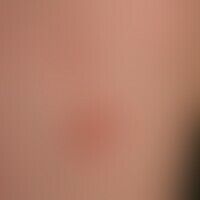Image diagnoses for "Plaque (raised surface > 1cm)"
560 results with 2840 images
Results forPlaque (raised surface > 1cm)

Necrobiosis lipoidica L92.1
Necrobiosis lipoidica: Overview of the left thigh: Approx. 3 cm large, slightly elevated, erythematous plaque without ulcerations.

Psoriasis palmaris et plantaris (overview) L40.3
Dry keratotic plaque type Chronically active, intermittent plaques, which have existed for more than 20 years, especially on the palm of the hand, multiple, rough, partly reddish, scaly, blurred spots, plaques and rhagades in a 54-year-old man.

Hypertrophic Lichen planus L43.81
Lichen planus verrucosus. solitary, chronically stationary, for months unchanged, very itchy, 5.0 cm large, rough, red, verrucous plaques on the lower leg. a highly chronic course over years is to be expected.

Psoriasis palmaris et plantaris (overview) L40.3
Psoriasis palmaris et plantaris. dry keratotic plaque type. non pretreated psoriasis palmaris. in a 42-year-old man, these sharply defined, rough, hyperkeratotic plaques, which have existed permanently for months, appear in the area of the right palm.

Late syphilis A52.-
Late syphilis: asymmetrical, scarred, bizarrely configured, brown, surface smooth plaques.

Tinea pedis (overview) B35.30
Tinea pedum (moccasin type). general view: For about 13 years non-healing redness and scaling, partly with severe itching, in the area of the right foot in a 30-year-old female patient. sharply defined, marginal scaling erythema, pustular formation, swelling of the foot with limited walking ability.

Dyskeratosis follicularis Q82.8
Chronicdyskeratosis follicularis, also affecting the Rima ani (see detailed picture), intertriginous, whitish and red-brownish sooty, blurred, macerated, superficially rough, clearly increased in consistency, itchy and unpleasantly smelling plaques.

Parapsoriasis en plaques large L41.4
Parapsoriasis en plaques large: asymptomatic , moderately sharply defined, disseminated patches and easily eliminated plaques on the trunk and extremities.

Tinea corporis B35.4
Tinea corporis:unusually elongated, non-pretreated, large-area tinea in known HIV infection

Acne (overview) L70.0
Acne vulgaris (overview): large,inflammatory retention cyst next to comedones and a few smaller inflammatory papules

Lupus erythematodes chronicus discoides L93.0
Chronic cheilitis in lupus erythematosus chronicus discoides: Chronically active, red, hyperesthetic plaques with adherent scaly deposits on lip skin and lip red.

Lichen sclerosus extragenital L90.0
Lichen sclerosus extragenitaler: white plaque with a shiny surface, existing for several months, completely without symptoms, slowly progressive; differential diagnosis is to exclude a morphea (histological confirmation).

Tinea cruris B35.8
Tinea cruris: chronic plaque that is slightly faded in the centre, accentuated at the edges, covering a large area and moderately itchy.

Erythema multiforme L51.0
Erythema multiforme. 10-year-old female patient with Z.n. herpes simplex virus infection 4 weeks ago. multiple, acutely occurring, itching, clearly infiltrated, 0.2-0.7 cm large, sharply defined, firm, red, smooth papules and partly confluent plaques with partly cocardial aspect and central blistering.

Ringworm B35.2
Tinea manuum. coarse lamellar scaling in the area of the palm and the sides of the fingers without significant erythema.

Lichen sclerosus of the penis N48.0
lichen sclerosus of the penis: distinct phimosis in a 4-year-old boy. the lichen sclerosus can still be diagnosed at the anterior fold of the prepuce. here a whitish, sclerotic ring is visible. a retraction of the foreskin was not possible anymore. the rapid circumcision is highly recommended.








